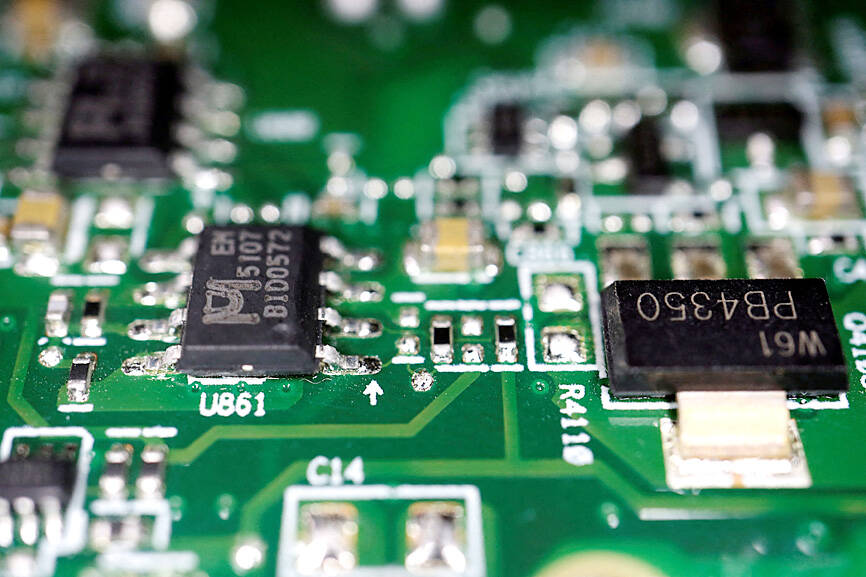Taiwan’s exports of integrated circuit chips last month dropped for a sixth consecutive month on slowing global demand.
Chip exports decreased 20.8 percent from a year earlier to a four-month low of US$12.6 billion, Ministry of Finance data showed.
Taiwan is home to Apple Inc and Nvidia Corp’s go-to chipmaker, Taiwan Semiconductor Manufacturing Co (TSMC, 台積電), along with a coterie of smaller, but essential chip industry players.

Photo: Reuters
The annual decline in chip exports was the largest since March 2009, partly amplified by a high base in June last year.
“The demand for integrated circuits continues to be weak,” the ministry said in a statement accompanying the data, as sticky inflation and continuous rate hikes by central banks have tapered the global economy.
Consumer tech firms have spent much of this year working through an inventory glut, which is expected to weigh on sales for the likes of TSMC through at least the end of the year.
Sales of smartphones have yet to resume growth after a protracted slump last year, while PC and laptop makers are also struggling to compel new purchases and continue to see double-digit declines.
US-China trade tensions have also affected Taiwan’s biggest industry. Shipments to China, including Hong Kong, which together account for more than 50 percent of Taiwan’s chip exports, fell for an eighth consecutive month, the data showed.
However, Yuanta Securities Investment Consulting Co (元大投顧) is cautiously optimistic about Taiwan’s semiconductor industry’s business outlook for this quarter.
“Looking into the third quarter, we expect handset related semiconductor supply chain to see downside risk given weaker-than-expected consumer and handset demand recovery in China,” Yuanta said in a note on Tuesday. “On the other hand, we expect PC and memory sectors to see more noticeable fundamental improvement as inventory digestion ends, with strong seasonality for consumer electronics to emerge in the third Additional reporting by staff writer

Semiconductor shares in China surged yesterday after Reuters reported the US had ordered chipmaking giant Taiwan Semiconductor Manufacturing Co (TSMC, 台積電) to halt shipments of advanced chips to Chinese customers, which investors believe could accelerate Beijing’s self-reliance efforts. TSMC yesterday started to suspend shipments of certain sophisticated chips to some Chinese clients after receiving a letter from the US Department of Commerce imposing export restrictions on those products, Reuters reported on Sunday, citing an unnamed source. The US imposed export restrictions on TSMC’s 7-nanometer or more advanced designs, Reuters reported. Investors figured that would encourage authorities to support China’s industry and bought shares

FLEXIBLE: Taiwan can develop its own ground station equipment, and has highly competitive manufacturers and suppliers with diversified production, the MOEA said The Ministry of Economic Affairs (MOEA) yesterday disputed reports that suppliers to US-based Space Exploration Technologies Corp (SpaceX) had been asked to move production out of Taiwan. Reuters had reported on Tuesday last week that Elon Musk-owned SpaceX had asked their manufacturers to produce outside of Taiwan given geopolitical risks and that at least one Taiwanese supplier had been pushed to relocate production to Vietnam. SpaceX’s requests place a renewed focus on the contentious relationship Musk has had with Taiwan, especially after he said last year that Taiwan is an “integral part” of China, sparking sharp criticism from Taiwanese authorities. The ministry said

US President Joe Biden’s administration is racing to complete CHIPS and Science Act agreements with companies such as Intel Corp and Samsung Electronics Co, aiming to shore up one of its signature initiatives before US president-elect Donald Trump enters the White House. The US Department of Commerce has allocated more than 90 percent of the US$39 billion in grants under the act, a landmark law enacted in 2022 designed to rebuild the domestic chip industry. However, the agency has only announced one binding agreement so far. The next two months would prove critical for more than 20 companies still in the process

CHANGING JAPAN: Nvidia-powered AI services over cellular networks ‘will result in an artificial intelligence grid that runs across Japan,’ Nvidia’s Jensen Huang said Softbank Group Corp would be the first to build a supercomputer with chips using Nvidia Corp’s new Blackwell design, a demonstration of the Japanese company’s ambitions to catch up on artificial intelligence (AI). The group’s telecom unit, Softbank Corp, plans to build Japan’s most powerful AI supercomputer to support local services, it said. That computer would be based on Nvidia’s DGX B200 product, which combines computer processors with so-called AI accelerator chips. A follow-up effort will feature Grace Blackwell, a more advanced version, the company said. The announcement indicates that Softbank Group, which until early 2019 owned 4.9 percent of Nvidia, has secured a